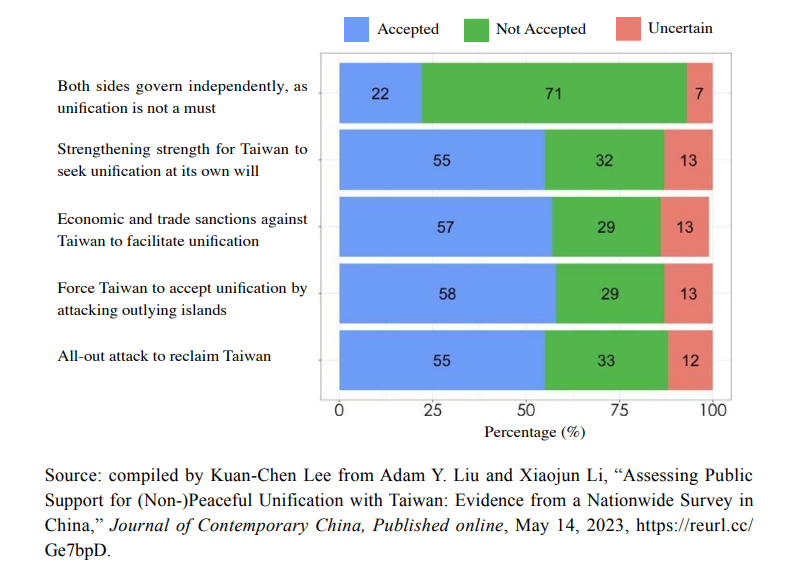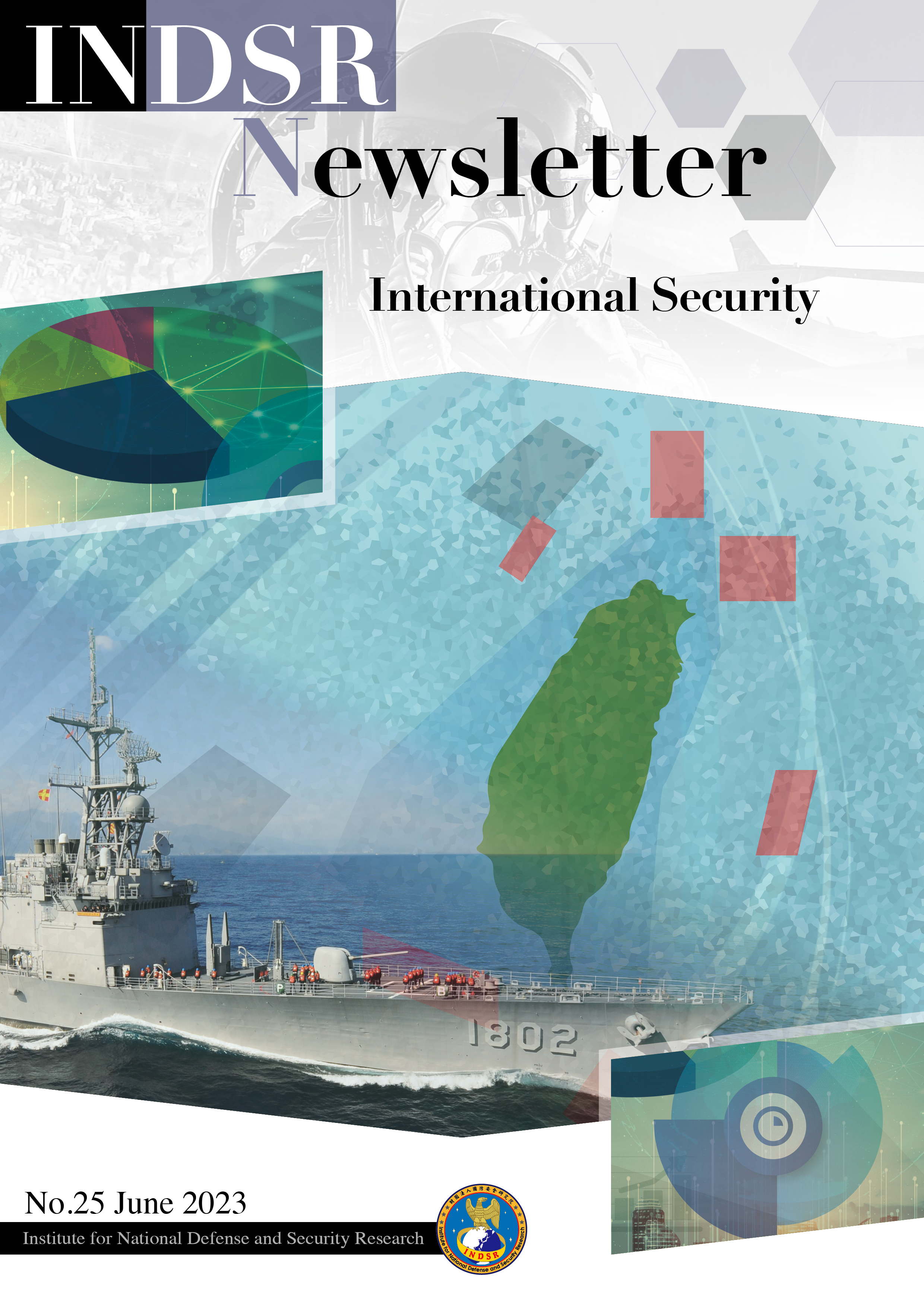Solving the Taiwan issue: Study Shows “Armed Unification” Is Not a Priority for Ordinary Chinese Citizens
2023.07.06
Views
230
PDF link:
1. News Highlights
Chinese State Councilor and Foreign Minister Qin Gang gave an interview to foreign media on May 8, 2023. When asked whether China and the US would go to war because of Taiwan, Qin Gang pointed out that “Taiwan is an inseparable part of China. We firmly defend national sovereignty and territorial integrity on the Taiwan issue and protect the interests of the 1.4 billion Chinese people, including those of Taiwan. Taiwan’s independence is the biggest threat to the peace and stability of the Taiwan Strait. China always insists on striving for peaceful unification with the utmost sincerity and efforts, but also reserves the option to take all necessary measures”.[1] After responding to foreign media, Qin Gang met with Nicholas Burns, the US Ambassador to China, on the same day, demanding the US properly handle the Taiwan issue, stop disturbing the “One China” principle, and refrain from indulging “Taiwan independence separatists”.[2] In recent years, China has been touting the “unification by force” theory. Although Beijing has not clearly stated the way and time to unify Taiwan, it often threatens to use force against Taiwan based on the so-called “will of the 1.4 billion Chinese people” consistently in official statements. Do the Chinese people, as a whole, really support the official stance of using military force to solve the Taiwan issue? What factors affect the Chinese public’s attitude towards unifying Taiwan by force? This article cites a recent Chinese survey to answer the above questions and interprets the implications behind the survey data.
2. Security Implications
This research paper, which is about the Chinese public’s views on how to solve the Taiwan issue, will soon be published in the academic journal “Journal of Contemporary China”. [3] The authors are professors Adam Liu from the National University of Singapore and Xiaojun Li from NYU Shanghai. They used Qualtrics’ Internet member sample pool in China and conducted quota random sampling Internet surveys at the end of October 2020 and the end of January 2021, with a total of 2,083 successful samples obtained from the two surveys. Although the successful samples shared higher education levels and mostly resided in urban areas, their opinions might represent China’s one billion Internet users. In the public poll, the two authors listed five possible Chinese policies towards Taiwan: 1. an all-out attack to reclaim Taiwan; 2. forcing the Taiwan authority to accept unification by attacking outlying islands such as Kinmen and Matsu; 3. using economic means to promote unification by imposing sanctions on Taiwan or even cutting off economic, trade, and personnel exchanges; 4. maintaining the status quo and continuously developing China’s economic and military power, and Taiwan will eventually seek unification at its own will; 5. Both sides govern independently, as unification is not necessarily a must. Each respondent was queried separately to see how they agreed on the policies. Their important research findings are as follows:
2-1.“Unification by force” is not the Chinese people’s priority option
Figure 1 depicts Chinese respondents’ overall acceptance of the above five policy options on the Taiwan issue. First, compared to the CCP’s claim that all Chinese people have endorsed its policy toward Taiwan, only about 55% of Chinese respondents support unifying Taiwan by force. In comparison, one-third (33%) explicitly said they could not accept unification by force, and 12% were not sure. Although calls for “unifying Taiwan by force” have risen on the Chinese Internet in recent years, the study result proved that neither these calls nor the CCP’s threats are true. The other three options, including “attacking outlying islands to force Taiwan to accept unification”, “implementing economic and trade sanctions against Taiwan to facilitate unification”, and “strengthening overall strength for Taiwan to seek unification at its own will”, only received support from about 55% to 58% of the respondents. In addition, at least about one-third of the respondents clearly stated that they could not accept or were unsure about these three options. In other words, the four policies towards Taiwan, including “unification by force”, were not ideal policies that stood out and gained widespread public acceptance. However, it is worth noting that over 70% of the people did not accept that “both sides govern independently, as unification is not a must”, meaning that under the CCP brainwashing, the vast majority of Chinese people today do not allow Taiwan to separate from China.
Figure 1: Chinese people’s attitude toward policy options to solve the Taiwan issue

2-2. Factors that weakened public acceptance of “non-peaceful” means to unify Taiwan
The study then further analyzes the factors influencing the Chinese public’s acceptance (or non-acceptance) of “non-peaceful” means of unifying Taiwan. Similar to previous studies,[4] both authors found that nationalism and peer pressure tend to reinforce the public’s desire to unify Taiwan through “non-peaceful” means. In other words, if some respondents strongly support Chinese nationalism, or if most of their friends and relatives take a hard-line stance toward Taiwan, they would more likely agree to unifying Taiwan by “non-peaceful” means.
On the other hand, the study also identifies several important factors that weakened public support for a “non-peaceful” unification of Taiwan. In descending order of statistical influence are economic costs, human casualties, resistance from the Taiwanese people and military, US military involvement, and damage to China’s reputation. Specifically, respondents were inclined not to support a “non-peaceful” solution to the Taiwan issue if they believed that the economic cost of unifying Taiwan would be significant, the casualty number would be high, the more they thought the Taiwanese military and people would resist, the more likely it was that the US would intervene in the Taiwan Strait war, and the more they agreed that China would attract a reputation for being “warlike”. Although the above factors are only the results of public opinion polls, they may represent the thoughts of the Chinese people and are enough to undermine the conditions for the Chinese people to support a “non-peaceful” unification of Taiwan. Surprisingly, the answers are highly similar to the risks and costs the CCP leadership must consider before invading Taiwan.
3. Trend Observation
3-1. Chinese people’s support for forceful unification will not increase in the short term
The poll shows that slightly more than 50% of the Chinese people supported “solving the Taiwan issue with force”, while nearly half disagreed or were unsure. Even though public opinion can be fluid, the author believes that the Chinese people’s current approval of unifying Taiwan by force is approaching its limit and is unlikely to increase soon unless there are major changes in the Taiwan Strait. The reason behind this argument can be related to the war between Russia and Ukraine. For the Chinese public, the ongoing conflict between Russia and Ukraine is a widely acknowledged reality, despite information from external sources that may be blocked or misleading. Despite discrepancies in the reported numbers of casualties, war damage, and economic losses suffered by Russian military personnel, the Chinese people still have witnessed the negative impact of a failed invasion on Russia’s overall national strength, international reputation, and great power status.[5] Based on the author’s assessment, it seems unlikely that the Chinese community’s voice will experience significant growth in the near future.
3-2. Avoiding war: Taiwan should increase the stake of the Chinese military invasion in multiple directions
The aforementioned public poll clearly points out that the Chinese public has various economic, military, and international reputation concerns regarding the approval of “non-peaceful” means to unify Taiwan. That means Taiwan should consider how to increase the stake of the CCP’s war against Taiwan in these directions. After all, all other things being equal, the more expensive it is for China to violate Taiwan by force, the less likely it is to choose to start a war. In terms of raising the cost of China’s invasion, for example, Taiwan should continue strengthening its leading position in high-tech and semiconductor technology in the economy and ensure that Taiwan is indispensable in the global supply chain of semiconductors. In addition, the determination of the Taiwanese people and military to resist must be maintained, and it must be continuously enhanced and translated into action through effective organization and training to become a formidable power to deter China from attempting to invade Taiwan by force. Finally, the support of allied countries and the international community for Taiwan is also crucial, as the public opinion study shows that the Chinese government and people still value China’s international reputation and status. Taiwan’s efforts in multiple directions will make China realize the high price of military invasion and discourage the idea of unifying Taiwan.
(Originally published in the 80th “National Defense and Security Biweekly”, May 26, 2022, by the Institute for National Defense and Security Research.)
(The contents and views in the assessments are the personal opinions of the author, and do not represent the position of the Institute for National Defense and Security Research.)
[1]“Qin Gang Accepts Written Interview from Saudi Arabia’s ‘Middle East News’,” Ministry of Foreign Affairs of China, May 8, 2023. https://www.mfa.gov.cn/web/wjbz_673089/zyjh_673099/202305/t20230508_11073304.shtml.
[2] Zhong Chenfang, “Qin Gang met Nicholas Burns and Urged the US to ‘Correctly Handle the Taiwan Issue.’ US State Department: One China Policy Unchanged and No Need for Modification,” Voice of America Cantonese, May 9, 2023, https://reurl.cc/ZXpRK3.
[3] Adam Y. Liu and Xiaojun Li, “Assessing Public Support for (Non-)Peaceful Unification with Taiwan: Evidence from a Nationwide Survey in China,” Journal of Contemporary China, Published online, May 14, 2023, https://reurl.cc/Ge7bpD. The complete text can be downloaded from the 21st Century China Center, University of California, San Diego, UCSD. See https://papers.ssrn.com/sol3/papers.cfm?abstract_id=4381723.
[4] Dongtao Qi, Suixin Zhang, and Shengqiao Lin, “Urban Chinese Support for Armed Unification with Taiwan: Social Status, National Pride and Understanding of Taiwan,” Journal of Contemporary China, Published online, August 02, 2022, https://reurl.cc/MRr6dk.
[5] Xie Yizhe, “Is the War between Russia and Ukraine Concluded? Chinese Media: If Russia Does Not Accept Failure, It Should Seek China’s Help to Solve These Two Problems,” Newtalk, May 15, 2023, https://newtalk.tw/news/view/2023-05-15/871275.


